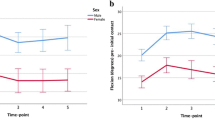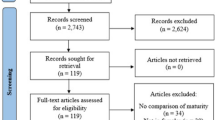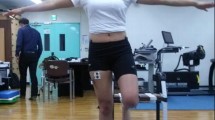Abstract
Background
The adolescent ‘growth spurt’ results in rapid growth of the skeletal system. It has been theorised that absence of a concomitant increase in muscular adaptations in female athletes may predispose them to an increased risk of anterior cruciate ligament injuries.
Objectives
To determine if sex differences exist in landing biomechanics and postural stability of adolescent athletes; with a further objective of determining if such differences are propagated during adolescence.
Data sources
The following databases were searched: MEDLINE, EMBASE, CINAHL, PEDro, PubMed, SPORTDiscus and Web of Science. Research papers were identified by including search terms for neuromuscular control, lower limb and pubertal development.
Inclusion Criteria
Studies were required to be written in English; report on biomechanical analyses; include landing or postural control tasks; be cross-sectional or longitudinal; and include healthy adolescent/pubertal subjects.
Study Appraisal and Synthesis Methods
A modified version of the Strengthening the Reporting of Observational studies in Epidemiology checklist was used to rate methodological quality. Meta-analyses were performed when more than one study reported on an outcome measure.
Results
Sixteen articles were included. The overall methodological quality of evaluated studies was low (mean score = 5.75/10 points). Adolescent females exhibited increased knee valgus with increasing maturity. There was no consensus on sex differences in postural stability.
Conclusions
With increasing maturation, females are characterized by increased knee valgus during landing tasks. To date, no research has longitudinally investigated postural stability development during adolescence in females, despite the importance of postural control training in injury prevention programmes. Therefore, further research on this topic is warranted.





Similar content being viewed by others
References
Prodromos CC, Han Y, Rogowski J, et al. A meta-analysis of the incidence of anterior cruciate ligament tears as a function of gender, sport, and a knee injury-reduction regimen. Arthroscopy. 2007;23(12):1320–5.e6.
Walden M, Hagglund M, Werner J, et al. The epidemiology of anterior cruciate ligament injury in football (soccer): a review of the literature from a gender-related perspective. Knee Surg Sports Traumatol Arthrosc. 2011;19(1):3–10.
Shultz SJ, Schmitz RJ, Benjaminse A, et al. ACL Research Retreat VI: an update on ACL injury risk and prevention. J Athl Train. 2012;47(5):591–603.
Hewett TE, Myer GD, Ford KR, et al. Biomechanical measures of neuromuscular control and valgus loading of the knee predict anterior cruciate ligament injury risk in female athletes: a prospective study. Am J Sports Med. 2005;33(4):492–501.
Paterno MV, Schmitt LC, Ford KR, et al. Biomechanical measures during landing and postural stability predict second anterior cruciate ligament injury after anterior cruciate ligament reconstruction and return to sport. Am J Sports Med. 2010;38(10):1968–78.
Padua DA, DiStefano LJ, Beutler AI, et al. The landing error scoring system as a screening tool for an anterior cruciate ligament injury-prevention program in elite-youth soccer athletes. J Athl Train. 2015;50(6):589–95.
Dingenen B, Malfait B, Nijs S, et al. Can two-dimensional video analysis during single-leg drop vertical jumps help identify non-contact knee injury risk? A one-year prospective study. Clin Biomech (Bristol, Avon). 2015;30(8):781–7.
Plisky PJ, Rauh MJ, Kaminski TW, et al. Star excursion balance test as a predictor of lower extremity injury in high school basketball players. J Orthop Sports Phys Ther. 2006;36(12):911–9.
Myer GD, Ford KR, Brent JL, et al. The effects of plyometric vs. dynamic stabilization and balance training on power, balance, and landing force in female athletes. J Strength Cond Res. 2006;20(2):345–53.
Myer GD, Stroube BW, Dicesare CA, et al. Augmented feedback supports skill transfer and reduces high-risk injury landing mechanics: a double-blind, randomized controlled laboratory study. Am J Sports Med. 2013;41(3):669–77.
Stroube BW, Myer GD, Brent JL, et al. Effects of task-specific augmented feedback on deficit modification during performance of the tuck-jump exercise. J Sport Rehab. 2013;22(1):7–18.
Sugimoto D, Myer GD, McKeon JM, et al. Evaluation of the effectiveness of neuromuscular training to reduce anterior cruciate ligament injury in female athletes: a critical review of relative risk reduction and numbers-needed-to-treat analyses. Br J Sports Med. 2012;46(14):979–88.
Brown TN, Palmieri-Smith RM, McLean SG. Sex and limb differences in hip and knee kinematics and kinetics during anticipated and unanticipated jump landings: implications for anterior cruciate ligament injury. Br J Sports Med. 2009;43(13):1049–56.
Mendiguchia J, Ford KR, Quatman CE, et al. Sex differences in proximal control of the knee joint. Sports Med. 2011;41(7):541–57.
Nakagawa TH, Moriya ET, Maciel CD, et al. Trunk, pelvis, hip, and knee kinematics, hip strength, and gluteal muscle activation during a single-leg squat in males and females with and without patellofemoral pain syndrome. J Orthop Sports Phys Ther. 2012;42(6):491–501.
Sigward SM, Powers CM. The influence of gender on knee kinematics, kinetics and muscle activation patterns during side-step cutting. Clin Biomech. 2006;21(1):41–8.
Decker MJ, Torry MR, Wyland DJ, et al. Gender differences in lower extremity kinematics, kinetics and energy absorption during landing. Clin Biomech. 2003;18(7):662–9.
Shultz SJ, Schmitz RJ, Nguyen AD, et al. ACL research retreat V: an update on ACL injury risk and prevention, March 25-27, 2010, Greensboro, NC. J Athl Train. 2010;45(5):499–508.
Quatman CE, Ford KR, Myer GD, et al. Maturation leads to gender differences in landing force and vertical jump performance: a longitudinal study. Am J Sports Med. 2006;34(5):806–13.
Shea KG, Pfeiffer R, Jo HW, et al. Anterior cruciate ligament injury in pediatric and adolescent soccer players: an analysis of insurance data. J Pediatr Orthop. 2004;24(6):623–8.
Bjordal JM, Arnly F, Hannestad B, et al. Epidemiology of anterior cruciate ligament injuries in soccer. Am J Sports Med. 1997;25(3):341–5.
von Elm E, Altman DG, Egger M, et al. The Strengthening the Reporting of Observational Studies in Epidemiology (STROBE) Statement: guidelines for reporting observational studies. Ann Intern Med. 2007;147(8):573–7.
Doherty C, Delahunt E, Caulfield B, et al. The incidence and prevalence of ankle sprain injury: a systematic review and meta-analysis of prospective epidemiological studies. Sports Med. 2014;44(1):123–40.
Holden S, Boreham C, Doherty C, et al. Dynamic postural stability in young adolescent male and female athletes. Pediatr Phys Ther. 2014;26(4):447–52.
Duzgun I, Kanbur NO, Baltaci G, et al. Effect of Tanner stage on proprioception accuracy. J Foot Ankle Surg. 2011;50(1):11–5.
Barber-Westin SD, Noyes FR, Galloway M. Jump-land characteristics and muscle strength development in young athletes: a gender comparison of 1140 athletes 9 to 17 years of age. Am J Sports Med. 2006;34(3):375–84.
Ford KR, Myer GD, Hewett TE. Valgus knee motion during landing in high school female and male basketball players. Med Sci Sports Exerc. 2003;35(10):1745–50.
Harrison AD, Ford KR, Myer GD, et al. Sex differences in force attenuation: a clinical assessment of single-leg hop performance on a portable force plate. Br J Sports Med. 2011;45(3):198–202.
Hewett TE, Myer GD, Ford KR, et al. Preparticipation physical examination using a box drop vertical jump test in young athletes: the effects of puberty and sex. Clin J Sport Med. 2006;16(4):298–304.
Hewett TE, Myer GD, Ford KR. Decrease in neuromuscular control about the knee with maturation in female athletes. J Bone Joint Surg. 2004;86(8):1601–8.
Hewett TE, Stroupe AL, Nance TA, et al. Plyometric training in female athletes. decreased impact forces and increased hamstring torques. Am J Sports Med. 1996;24(6):765–73.
Sell TC, Ferris CM, Abt JP, et al. The effect of direction and reaction on the neuromuscular and biomechanical characteristics of the knee during tasks that simulate the noncontact anterior cruciate ligament injury mechanism. Am J Sports Med. 2006;34(1):43–54.
Schmitz RJ, Shultz SJ, Nguyen AD. Dynamic valgus alignment and functional strength in males and females during maturation. J Athl Train. 2009;44(1):26–32.
Sigward SM, Pollard CD, Powers CM. The influence of sex and maturation on landing biomechanics: implications for anterior cruciate ligament injury. Scand J Med Sci Sports. 2012;22(4):502–9.
Yu B, McClure SB, Onate JA, et al. Age and gender effects on lower extremity kinematics of youth soccer players in a stop-jump task. Am J Sports Med. 2005;33(9):1356–64.
Sasaki S, Tsuda E, Yamamoto Y, et al. Change with increasing age in control of the lower limbs during jump-landing in adolescents: a 5-year prospective study. J Orthop Sci. 2013;18(5):774–81.
Ford KR, Shapiro R, Myer GD, et al. Longitudinal sex differences during landing in knee abduction in young athletes. Med Sci Sports Exerc. 2010;42(10):1923–31.
Ford KR, Myer GD, Hewett TE. Longitudinal effects of maturation on lower extremity joint stiffness in adolescent athletes. Am J Sports Med. 2010;38(9):1829–37.
Hewett TE, Torg JS, Boden BP. Video analysis of trunk and knee motion during non-contact anterior cruciate ligament injury in female athletes: lateral trunk and knee abduction motion are combined components of the injury mechanism. Br J Sports Med. 2009;43(6):417–22.
Quatman-Yates CC, Quatman CE, Meszaros AJ, et al. A systematic review of sensorimotor function during adolescence: a developmental stage of increased motor awkwardness? Br J Sports Med. 2012;46(9):649–55.
Malina RM, Bouchard C, Bar-Or O. Growth, maturation, and physical activity. 2nd ed. In: Timing and sequence of changes during adolescence. Champaign, IL: Human Kinetics; 2004.
DeVita P, Skelly WA. Effect of landing stiffness on joint kinetics and energetics in the lower extremity. Med Sci Sports Exerc. 1992;24(1):108–15.
Whittaker JL, Woodhouse LJ, Nettel-Aguirre A, et al. Outcomes associated with early post-traumatic osteoarthritis and other negative health consequences 3-10 years following knee joint injury in youth sport. Osteoarthritis Cartilage. 2015;23(7):1122–9.
Myer GD, Faigenbaum AD, Foss KB, et al. Injury initiates unfavourable weight gain and obesity markers in youth. Br J Sports Med. 2014;48(20):1477–81.
Myer GD, Sugimoto D, Thomas S, et al. The influence of age on the effectiveness of neuromuscular training to reduce anterior cruciate ligament injury in female athletes: a meta-analysis. Am J Sports Med. 2013;41(1):203–15.
Lauersen JB, Bertelsen DM, Andersen LB. The effectiveness of exercise interventions to prevent sports injuries: a systematic review and meta-analysis of randomised controlled trials. Br J Sports Med. 2014;48(11):871–7.
Myer GD, Bates NA, DiCesare CA, et al. Reliability of 3-dimensional measures of single-leg drop landing across 3 institutions: implications for multicenter research for secondary ACL-injury prevention. J Sport Rehabil. 2015;24(2):198–209.
Powers CM. The influence of abnormal hip mechanics on knee injury: a biomechanical perspective. J Orthop Sports Phys Ther. 2010;40(2):42–51.
Author information
Authors and Affiliations
Corresponding author
Ethics declarations
Funding
Sinéad Holden was funded for this work by the Irish Research Council for Science Engineering and Technology’s Embark Postgraduate Scholarship scheme. No other sources of funding were used to assist in the preparation of this article.
Conflicts of interest
Sinéad Holden, Colin Boreham and Eamonn Delahunt declare that they have no real or perceived conflicts of interest relevant to the content of this review.
Rights and permissions
About this article
Cite this article
Holden, S., Boreham, C. & Delahunt, E. Sex Differences in Landing Biomechanics and Postural Stability During Adolescence: A Systematic Review with Meta-Analyses. Sports Med 46, 241–253 (2016). https://doi.org/10.1007/s40279-015-0416-6
Published:
Issue Date:
DOI: https://doi.org/10.1007/s40279-015-0416-6




